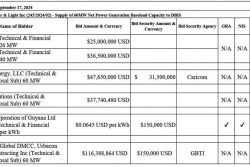The Ministry of Health has invited companies to prequalify for supplying medicines and medical supplies to the Ministry between 2014 and 2016, says an advertisement in the Guyana Chronicle on Tuesday.
The advertisement which seemed to have only appeared in the Guyana Chronicle says that the Ministry of Health through the Government of Guyana has received funding in its National Budget for the supply and delivery of pharmaceuticals/other medical supplies/consumables for the period 2014 to 2016. Interested bidders were asked to uplift prequalification documents at the ground floor of the Ministry of Health Brickdam.
“The Ministry of Health through its Materials Management Unit for the above intends to prequalify suppliers and/or firms for the supply of the above said goods. It is expected that Invitations for Bids will be made in November 2013,” the advertisement says.
The advertisement, which has not been posted on the woefully out-of-date E-Procure website, states that prequalification will be conducted through prequalification procedures specified in the current edition and will be open to all bidders from eligible source countries.
It says that interested bidders may obtain further information from and inspect and uplift the prequalification documents via compact disc upon submission of an official letter requesting the documents from the MMU.
President of the Transparency Institute of Guyana Inc. Anand Goolsarran told Stabroek News that while the Act may be weak in that it allows the Ministry itself to carry out the assessment for the prequalification, the law is clearly breached in that the advertisements appeared in the Chronicle only.
He pointed to Section 6 (1) (a) of the Act states, “A procuring entity shall solicit invitations to prequalify by causing an invitation to prequalify to be published in newspapers of wide circulation and posted in public places. Such solicitations shall reach the area impacted by the procurement.”
Goolsarran, former Auditor General of Guyana, said that the Guyana Chronicle could hardly be considered a newspaper of wide circulation and to the extent that the advertisement does not appear in any other newspaper is a breach of Section 6 of the Act. “The advertisement is in order but the big question is was it advertised in a newspaper of wide circulation?” he said.
He said that for large and complex works and services, it may be desirable to limit the bidding to only those who meet the specified criteria, since this is likely to reduce significantly the administrative burden of evaluating a large number of bids. “When the actual works or services are advertised only those who prequalified are eligible to bid,” he said.
“One apparent shortcoming in the Act is that there is no provision for the prequalification assessment to be done by the relevant tender board and its evaluators but rather the budget entity,” he said. “The National Procurement and Tender Administration Board will not assess the prequalification bids…it is the Ministry of Health. And I thought that that was one of the weaknesses of the Act,” he said.
He said that the Act points out that prequalification could be applied for large complex works or services. “I am not sure whether goods fall under this because it said for works/services that are complex,” he said.
He said that sole sourcing is a different scenario and is utilised when good, services or works are only available from a particular supplier or a contractor by virtue of their highly complex or specialised nature, or where the supplier or contractor has exclusive rights to these goods, services or works. But he said that the sole sourcing can be abused. “The Government was acquiring drugs and medical supplies from the New GPC through the sole sourcing method. GPC is not the only company that produces drugs,” he said.
“It was wrong for the Government to enter into an agreement for sole sourcing with New GPC because they are other suppliers. We all know that there are other suppliers,” he stressed. He cited the example of the military as a case for sole sourcing specialised military equipment from a particular manufacturer. He said that a compelling enough case has not been made by Government to justify sole sourcing of drugs from the New GPC – that the goods to be procured are of a specialised nature or that only the New GPC could produce or import it.




